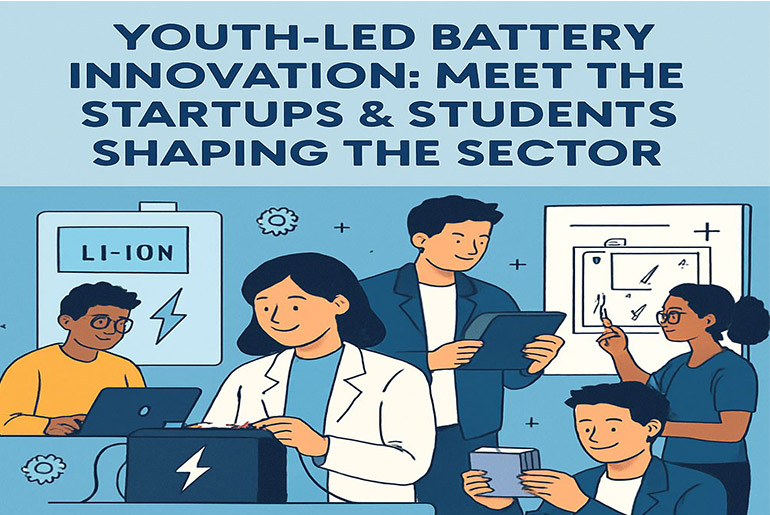In the corridors of IITs, incubators, and garage labs across India, a vibrant energy is building—an energy driven by youth, innovation, and the pursuit of sustainable battery solutions. As India strides toward electrification, these startups and student-led research projects are accelerating progress—reimagining battery chemistry, recycling, and smart systems with local ingenuity. Here’s a deep dive into this emerging ecosystem, spotlighting the most promising players, breakthrough labs, and competitions that are truly recharging the future.
Lab to Prototype: Student Researchers Push the Walls
K. Ramakrishnan College of Engineering (Trichy)
A recent MoU with High Energy Batteries (India) Limited empowers students from Electrical, EEE, Mechanical, and Chemical Engineering to access real-world battery manufacturing environments. Around 20 students and 20 faculty per year engage in joint R&D and internships focused on silver-oxide zinc and nickel-cadmium cells.
Nagaland University
Researcher Dipankar Hazarika has received backing from the Norwegian Embassy to explore flexible, wearable battery tech—an exciting cross-border push on sustainable energy-storage materials.
IIT Kanpur’s EngSUI Startup Innovation Quest
Beyond labs, this annual hackathon (in collaboration with Engineers India Limited) offers up to ₹5 crore in funding for student innovations in renewable energy and storage—encouraging deep technology breakthroughs at scale.
Incubators & Student-Sparked Startups
Offgrid Energy Labs (IIT Kanpur)
The team behind ZincGel® batteries—non-toxic, solvent-free zinc-based systems designed to rival lead acid and lithium-ion—has incubated via IIT Kanpur and is aiming for commercial scale by 2025.
Indi Energy (IIT Roorkee)
Winners of the National Startup Award in 2022, this venture delivers sodium-ion batteries crafted from agricultural residue like paddy straw and coconut shells—offering cost-effective and eco-conscious alternatives to lithium-ion.
Log9 Materials (IIT Roorkee / Bangalore)
With 16 graphene patents, Log9 has developed aluminium-air batteries, LFP and LTO cells, and supercapacitors. Its Jakkur facility marks India’s first commercial Li-ion cell manufacturing line.
Grinntech (IIT Madras Research Park, Chennai)
Founded in 2018, this startup builds Li-ion battery packs tailored for EVs, including patented BMS modules enabling fast swapping solutions.
Lohum Cleantech (Delhi)
A full-stack recycler, Lohum recovers battery-grade materials from end-of-life Li-ion batteries, produces second-life packs, and has clocked over one million miles in real-world usage.
BatX Energies (Gurugram)
Founded in 2020, BatX extracts high-purity metals from black mass via proprietary hydrometallurgy and raised a $5 million Pre-Series A round in 2023.
Hackathons: Breeding Grounds for Innovation
IIT-ISM Dhanbad at India Energy Week Hackathon
A student team won top prize for developing a bamboo-derived nitrogen-doped graphene nanopowder to capture CO₂—highlighting India’s push toward carbon capture and green energy.
PES University’s HashCode Hackathon
Although general-purpose, this annual event attracts participation from across India and often includes battery-related challenges—an important nurturing ground for battery tech ideas.
Incubators & Platforms Fueling Growth
IIT Mandi Catalyst
Himachal Pradesh’s first tech incubator—home to over 350 startups—hosts energy-tech founders like SolarLabs, supporting rural and student innovations.
I-Hub Gujarat
A 1.5 million sq. ft. student innovation space funding over 840 startups, including several cleantech and battery-focused initiatives.
E-Cell IIT Bombay
Through Hackathons (EnTech), Eureka!, and the E-Summit, E-Cell IITB provides early-stage support, mentorship, and seed funding to student-led energy teams
The Path Ahead: Challenges, Promise & Scale
| Challenge | Youth Response |
| Limited local manufacturing infrastructure | ZincGel and Indi Energy use chemistry suitable for India’s existing lead-acid / Li-ion facilities |
| Funding for deep-tech R&D | Hackathons and incubators now offer ₹5–100+ lakh funding pools |
| Commercial validation | Pilots with Shell’s E4 program, government linkages, and national awards boost credibility |
| Scaling impact | Lohum and BatX are building nationwide recycling networks; startup pilots focus on local ecosystems |
India stands at the cusp of a massive clean-energy transformation. As gigafactories are announced and EV uptake accelerates, the future of local chemistry, circularity, and smart systems is brighter than ever in India. Young innovators are showing us:
- affordability—local chemistries are a way to lower future dependencies on imports and costs;
- Circularity—recycling first can establish the resources of India’s future.
- equity—innovation must be democratic—that innovation can occur outside of large metropolises and corporate labs;
- resilience—climate-smart and agile solutions that are relevant to the Indian context.
These student-led projects are not just projects; they are national investments that show solutions can come from students committed to delivering on sustainability outside cloistered classrooms or communities.
The battery revolution in India is not coming from boardrooms—it is coming from the dorm rooms, campus labs and first stage start-ups of today. Youth innovation is not about reacting to the situation; it is about creating new materials, sustainable systems, and indigenous manufacturing pathways that reflect India’s positionality. This wave is about batteries that are socially relevant, economically inclusive, and technologically advanced.



